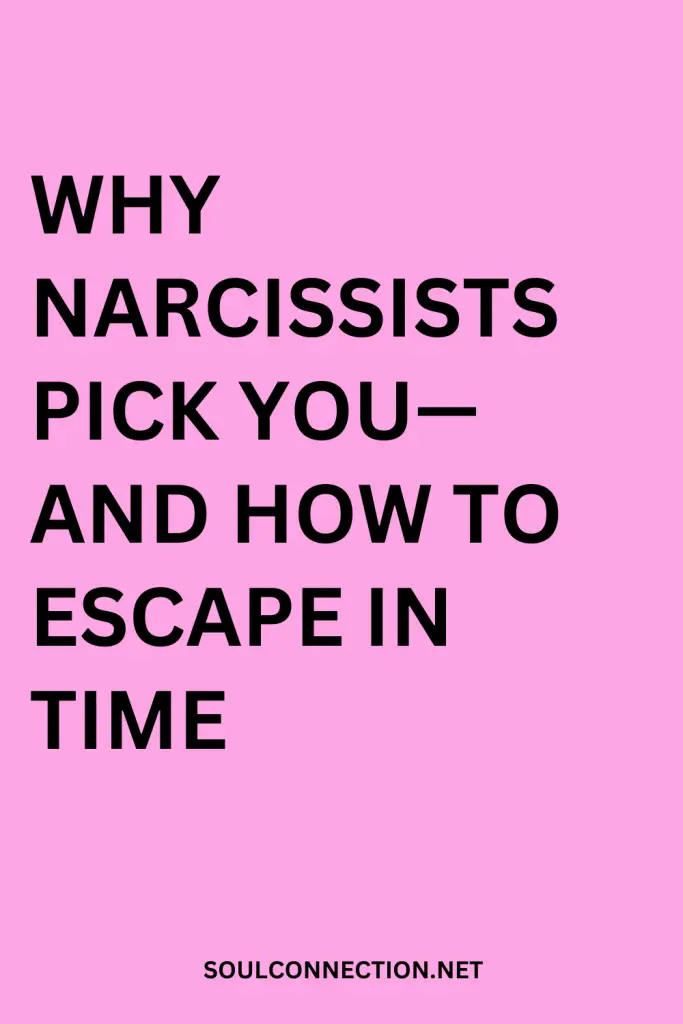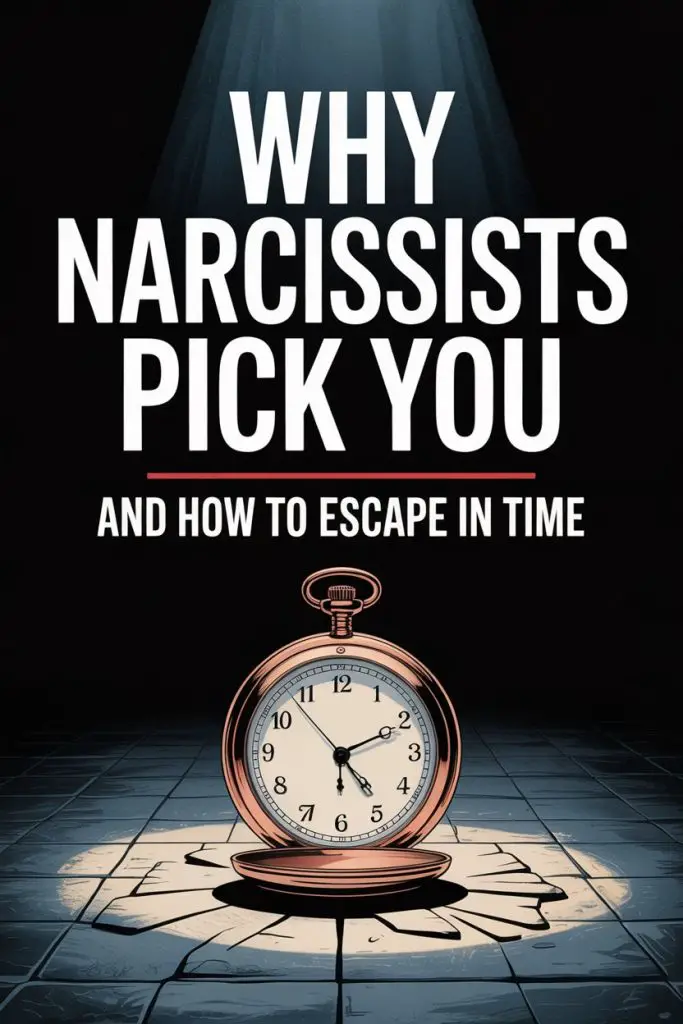Ever had the creeping suspicion your new love interest might care more about their own reflection than, say, your birthday? Been charmed, dazzled, and then left feeling like you’ve just survived an emotional twister?
If you keep attracting partners who leave you feeling more like an accessory than a human, you’re not alone. Narcissists have a sixth sense for spotting certain traits—and they know just how to get their hooks in.
The good news? You can spot this pattern and bail before the drama unfolds.
The Magnetism of the Empath
Narcissists don’t pick partners at random. They’re on the lookout for people who radiate warmth, compassion, and a bottomless well of empathy.
These traits are absolute catnip for narcissists because, deep down, they crave someone who will shower them with attention without demanding much back.
If you’ve ever been told you’re “too nice,” or catch yourself apologizing when someone else steps on your foot, you might be exactly their type.
They gravitate toward kindness like moths to a flame—only instead of basking in it, they’re there to soak it up for themselves.
What you see as a virtue, a narcissist sees as an opportunity.
Spotting the Red Flags They Wave (But Hope You’ll Ignore)
A narcissist’s charm is legendary—it’s in the manual. When they meet someone with a giving heart, they switch on the high beams: flattery, big promises, whirlwind romance.
Suddenly, you’re the most fascinating person in the room, and their affection comes in heavy doses.
This isn’t genuine interest. It’s an audition. They’re testing if you’ll cheerfully hand over your emotional energy, accept their excuses, and stick around when their mask slips.
That charming streak quickly gives way to criticism, silent treatments, or guilt trips.
If you find yourself rationalizing their rudeness (“He’s just stressed!”) or working overtime to please them, it’s time to ask: Are their needs always priority number one?
Why Your Boundaries Become Their Playground
Ever feel like your boundaries are more like suggestions than actual limits? Narcissists excel at sniffing out people who hesitate to say no—or feel responsible for other people’s moods.
They may push you to see them more than you want, borrow money, or guilt you into forgiving bad behavior. The minute you try to assert yourself, you’re accused of being selfish or uncaring.
If you’re used to bending over backwards to keep the peace, you’ve got an invisible “open for exploitation” sign—a narcissist’s favorite décor.
How Their Script Hooks Into Old Wounds
Narcissists are expert scriptwriters, and their favorite genre is “Fix Me.” If you grew up having to manage other people’s feelings or always put yourself last, a narcissist’s appeals for help can feel familiar—even comfortable.
There’s a sneaky appeal to the drama: You’re the only one who understands them. You’ll finally be enough to make someone happy.
Spoiler alert: You won’t. The goalposts move faster than a seagull at a picnic.
Recognizing that this isn’t love, but a role you’ve played before, is a massive step out of the spin cycle.
Why They Love Bomb and Then Ghost
During the honeymoon phase, a narcissist showers you with attention, affection, and probably three playlists they made “just for you.” This over-the-top adoration is actually more like a sales pitch than a genuine connection.
The second you start asking for your needs to be met, or (heaven forbid) the spotlight shifts away from them, the affection vanishes faster than a sock in the dryer.
You’ll be left wondering where the person you fell for has gone.
And the worst part? You’ll blame yourself for their sudden cold shoulder. Classic narcissist move. You’re left chasing that original high, hoping you can get back in their good graces.
How to Spot the “You” That Attracts Them
No shame here—being kind, generous, and empathetic isn’t a flaw. But if you find yourself always playing nurse, therapist, or cheerleader in relationships, it’s worth a second look.
Questions for the mirror:
- Do I feel responsible for my partner’s happiness or mood?
- Am I always the one apologizing, even when I’m not at fault?
- Have I lost touch with my own needs because theirs always come first?
- Am I afraid to say no, even to small requests?
If these ring a bell (or sound like a loud siren), your niceness might be the very thing that makes you stand out to narcissists.
Building the Early Warning System
Imagine having a “narc-o-meter” that goes off when someone’s charm feels a little hungry. While this device doesn’t exist, a few habits can help you see trouble coming before it parks in your driveway.
Pay attention to how they react when you say no or set small boundaries. Does irritation bubble up fast? Are your feelings met with impatience or boredom?
If everything’s about them and your needs get brushed aside, that’s your cue to take a step back.
If you find yourself explaining away their behavior to friends—“He just had a rough childhood!”—ask if you’d accept this from anyone else.
Armor Up With Boundaries
Boundaries are the antidote to the narcissist’s game. And no, you don’t have to become a stone-hearted robot. Instead, get comfortable naming what you need and sticking to it—even if it ruffles feathers.
This could be as simple as, “I’m not comfortable lending money,” or “I need time to myself tonight.” If that earns you sulking or a guilt trip, you’ve hit a nerve.
You’ll quickly learn whether this person respects limits—or only respects what they can get from you.
Think of boundaries as your personal mosquito net. The right ones keep out more than just bad dates.
Escape Routes: How to Get Out Before You’re In Too Deep
If you’ve already started to feel the narcissist quicksand, don’t panic. There are ways out.
Start by reconnecting with people who know you best—friends, family, even that one brutally honest mate who’s never liked your new partner.
Confide in someone outside the romance bubble. Their perspective will be clearer, and they can help you spot manipulation or gaslighting.
If you’re feeling isolated or drained, cut down on contact. Make plans with others. Reclaim your time and energy.
Narcissists hate competition for your attention, so the more you focus on your own life, the easier it gets to step back.
If things turn nasty—threats, intimidation, or emotional blackmail—don’t hesitate to get support. A therapist, counselor, or even a good old-fashioned support group can work wonders. You deserve backup.
Setting Up Your Narcissist-Free Zone
No magic formula guarantees you’ll never cross paths with a narcissist again—but turning up the volume on your own self-worth and boundaries makes you a much less appealing target.
Keep your standards high, your boundaries clear, and your social network strong. When someone new seems too good to be true, give it time.
People who respect you don’t pressure, rush, or guilt you into giving more than you’re ready to share.
A narcissist’s power comes from your willingness to overlook the red flags. Once you stop making excuses for their behavior, the spell breaks.
Your Life, Your Terms
Escaping the pull of a narcissist isn’t about becoming hard and cynical. It’s about trusting yourself to spot the difference between genuine connection and a performance.
The next time someone leaves you feeling drained, doubting your worth, or twisting yourself into a pretzel to make them happy, it’s not you—it’s them. (No, really.)
Your kindness and empathy aren’t flaws; they just need a bit of armor.
Love can be thrilling, messy, and, yes, risky. But with a sharp eye and strong boundaries, you can keep your heart open for the right person—while keeping narcissists at arm’s length, where they belong.


